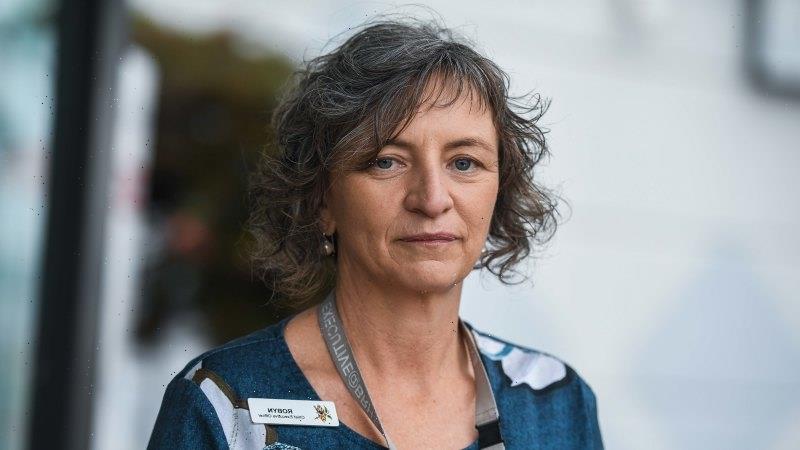NSW teachers have voted unanimously to take industrial action next month over stagnant wages, unsustainable workloads and a workforce “crisis”.
The strike, voted on at a meeting of the NSW Teachers Federation council in Sydney on Saturday, will be the first in almost a decade as the pay dispute with the state government escalates.
Julie Ross, the principal of Kogarah High School and a vice-president of the NSW Teachers Federation, has lost teachers and she’s struggling even to find casual teachers to fill in.Credit: Chris Lane
The organisation’s president Angelo Gavrielatos said members had shown a “determination and resolve I haven’t seen before”.
The strike will take place on Tuesday, December 7.
The industrial action comes after ongoing pay negotiations between the federation and the Education Department hit a wall. The federation wants a pay rise of between 5 and 7.5 per cent to acknowledge the skills and experience of educators, and two more hours of planning time a week.
But under public sector wage caps introduced in 2011, the department cannot offer increases of more than 2.5 per cent.
Teachers and principals will strike over an ongoing pay dispute with the state government.Credit:iStock
With confidential department documents revealing the teaching workforce facing a growing staffing shortage, the federation argues that stagnating wages mean the industry can’t offer competitive salaries to attract and retain workers.
“The government can no longer ignore this crisis,” Mr Gavrielatos said.
NSW Premier Dominic Perrottet, said he would be “disappointed” if the strike went ahead after having multiple discussions with the federation over the past few weeks.
“The support we give for all our frontline public service [workers], our nurses here, our doctors, our teachers, our police officers, 2.5 per cent in circumstances where hundreds of thousands of people right across our state have lost their job at this difficult time, we believe is fair and reasonable,” he said.
Mr Perrottet said he understood some of the federation’s concerns and would work with it to reach a compromise, but the 2.5 per cent cap would not be altered. He said the matter would have to be resolved by the Industrial Relations Commission.
"We want to make sure we do everything we can to provide the best support we can for our teachers who are doing a fantastic job right across our state. When we can provide more support we will," he said.
But while the standoff continues, the sector is struggling with a staffing shortage that is only getting worse.
It’s a problem that Julie Ross, the principal of Kogarah High School, is experiencing firsthand. Several of her staff members have resigned due to burnout, and she’s struggling even to find casual teachers to fill in.
“Last week in my school, I had a head teacher walk into my office and tell me that, after a number of years working for the department, she is resigning. I had a second-year teacher, permanent classroom teacher, walk into my office and say, ‘I can’t do this any more … this is not what I signed up for,’ ” Ms Ross said.
“For each of those two positions I received one application; they were advertised statewide … my school is not an unattractive school, it’s 30 minutes’ maximum on a slow train from Central.”
She believes Sydney’s high cost of living combined with comparatively low teaching salaries are contributing to the problem.
Beginner teachers in NSW earn $72,263 a year compared with $75,471 for those in Queensland. Teachers in the highest paying bands will earn $107,779 in NSW compared with $108,000 to 110,000 in Queensland.
The federation says the number of vacant permanent teaching positions has increased by 80 per cent since June, and it will launch a radio, television, and print advertising campaign to bring greater attention to the problem.
Ms Ross, who is also a vice-president of the federation, said there was seething anger at the state government within the sector, particularly after the pressure put on teachers during the COVID-19 pandemic.
She also said she expected the state government to take legal action in an attempt to stop the strike from taking place.
“No doubt they will take legal action, but the situation now with teachers, the anger is palpable. Take the action you need to take because we have an obligation to public education to do something,” Ms Ross said.
”I know there that there is a frustration with the lack of respect, I know that there is a frustration where we hear about major changes to our work through the media.”
The NSW Department of Education has been contacted for comment.
The Morning Edition newsletter is our guide to the day’s most important and interesting stories, analysis and insights. Sign up here.
Most Viewed in Politics
From our partners
Source: Read Full Article




